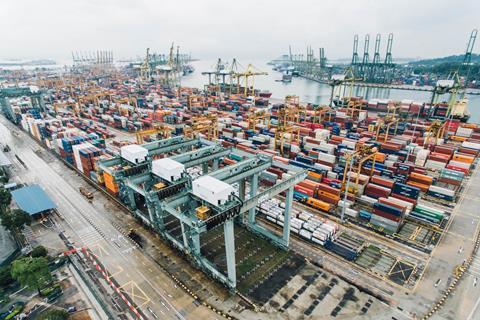The report, released by the Global Maritime Forum identifies four actions that maritime and shipping industries can take to support shipping’s transition to a sustainable and resilient zero-emission future.

The shipping industry could save up to USD $50 billion through four enablers of operational efficiency that prioritise an ESG agenda, a new insight brief series suggests.
The report, released by the Global Maritime Forum identifies four actions that maritime and shipping industries can take to support shipping’s transition to a sustainable and resilient zero-emission future.
The shipping industry is currently facing significant transformation as it works towards full decarbonisation by 2050. Short-term actions that improve the operational efficiency of existing vessels can play a critical role in reducing emissions today while also preparing for a more manageable long-term transition, experts advise. This will involve more expensive zero-emission fuels and eventually a price on carbon.
Although zero-emission fuels and technologies are essential for the decarbonisation of the industry, they are not commercially available at scale today. Cutting down on fuel costs by improving the operational efficiency of fleets will be a prerequisite for the adoption of more expensive zero-emission fuels and a foundation for green corridors – routes between major port hubs where zero-emission solutions are supported and demonstrated.
The report suggests that maximising vessel and fleet performance through operational efficiency can reduce annual fuel costs by $50 billion at today’s prices. That means up to 20% of fuel costs will be saved up and even more if combined with energy-efficient technologies.
The research also suggests that optimising operational efficiency has the potential to reduce annual emissions by more than 200 million tonnes of CO2.
The insight brief, which is the result of over a year of industry input, provides an overview of the short-term opportunities and barriers to operational efficiencies and takes a system view to explore the role of operational efficiency measures as enablers of shipping decarbonisation in the longer term.
The report identifies four types of solutions: better transparency and standardisation of performance data, scaling up pilots and best practices, contractual changes to encourage virtual arrival practices when there is a delay at the discharge port, and policies and regulations to enable new business models.
The International Maritime Organisation (IMO) is expected to adopt a revised greenhouse gas emissions strategy at the MEPC 80 meeting in July – the most important climate meeting for shipping this year.
While the industry is unsure whether the outcome of MEPC 90 will result in the adoption of a low-ambition or high-ambition strategy, in either case, the need for short-term operational efficiencies will be crucially important for the transition.
According to Randall Krantz, Senior Adviser on Decarbonisation at the Global Maritime Forum, the operational performance of vessels and entire fleets presents a huge opportunity to the shipping industry. However, it will require unprecedented levels of disruptive thinking to break through from dialogue to action.
The shipping industry is one of the largest emitters of greenhouse gases globally, with shipping emissions accounting for about 3% of the world’s total greenhouse gas emissions. According to the International Maritime Organisation, if left unchecked, shipping emissions could rise by up to 250% by 2050.
Shipping companies are under increasing pressure from governments, investors, and customers to reduce their emissions and become more sustainable. Many companies are already taking steps to reduce their carbon footprint, such as investing in more fuel-efficient ships and exploring the use of alternative fuels.
However, the transition to a sustainable and resilient zero-emission future will require a collective effort from the entire industry, including governments, investors, and customers.
Eman Abdalla, Global Operations & Supply Chain Director at Cargill Ocean Transportation, one of the largest transporters of dry and bulk cargo in the world, said:
“We need to clean up shipping supply chains and optimise our operations. To do this, we must collaborate, standardise, and be transparent. Let’s share the benefits of slowing down and let’s collectively make a difference.
Taking place on the 6th & 7th June 2023, #RISK Digital EU Focus will examine the changing risk landscape in a content rich, knowledge sharing environment.
Attendees will be able to learn and better understand how to mitigate risks, reduce compliance breaches, and improve business performance.
REGISTER HERE FOR #RISK DIGITAL EU FOCUS
Related Sessions:
→ Sustainable Business Practices: Balancing Profit with Environmental Responsibility
- Day 2: Wednesday 7th June 2023
- 12:45 PM - 13:30 PM BST
Speakers:
- Speaker lineup to be announced – please check back soon.













No comments yet